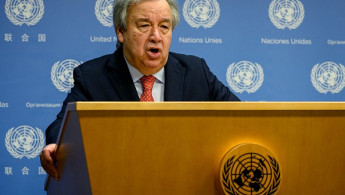Can invoking UN's Article 99 end Israel's war on Gaza?
In a rare move on Wednesday, United Nations Secretary-General Antonio Guterres invoked Article 99 of the UN Charter to formally alert the Security Council about the global threat posed by Israel's onslaught on Gaza.
The move marked the first time Guterres invoked Article 99 since taking office in 2017.
Despite Guterres' repeated calls for an "immediate humanitarian ceasefire" since 18 October, the Security Council has not yet adopted a resolution due to differences among permanent members, namely US objection.
The United States, a key ally of Israel, has vetoed one resolution, while Russia, expressing concerns about Israel's actions, has blocked another.
What is Article 99?
A rarely used diplomatic tool, Article 99, contained in Chapter XV of the Charter, allows the head of the UN to raise to the Security Council’s attention "any issue that may aggravate existing threats to the maintenance of international peace and security".
Official UN documents describe Article 99 as having a preventative function – raising awareness at an international level that an already severe crisis could get worse.
The UN takes the risk of a major regional crisis seriously, where a civil war or conflict between two countries looks as if it may spread, as is the case with the Israel-Gaza war, which experts fear is dragging in Lebanon, Syria, Iraq and Yemen.
Gutterres’s letter to the President of the Security Council, Jose Javier de la Gasca Lopez Dominguez, began by condemning "more than eight weeks of hostilities in Gaza and Israel have created appalling human suffering, physical destruction and collective trauma across Israel and the Occupied Palestinian Territory".
Guterres said that the war has "potentially irreversible implications for Palestinians as a whole and for peace and security in the region".
"Such an outcome must be avoided at all costs," he added.
Now Guterres will have the right to speak at the Security Council without having to be invited to speak by a member state, as is usually the case.
Can invoking Article 99 stop Israel?
Since launching its relentless offensive on the besieged Gaza Strip on 7 October, Israel has repeatedly clashed with the United Nations.
At least 130 UN staff have been killed in Israeli bombings. This is the highest number of UN personnel killed in a conflict in the history of the organisation.
Israel has repeatedly targeted several UN officials, including Guterres himself, along with Francesca Albanese, the UN’s special rapporteur for the occupied Palestinian territories and the UN Humanitarian Coordinator Lynn Hastings.
On Wednesday, Tel Aviv announced it was revoking Hastings' residency visa.
“Someone who did not condemn Hamas for the brutal massacre of 1,200 Israelis … but instead condemns Israel, a democratic country that protects its citizens, cannot serve in the UN and cannot enter Israel!” wrote Israeli foreign minister Eli Cohen on X.
The incident was only the latest in a series of instances in which Israel clashed with the UN over the war in Gaza in ways that are uncommon for member states of the global body.
Earlier, on 18 October, after the bombing of the Ahli Arab Hospital in Gaza, Guterres called for an immediate ceasefire in the region, condemning the collective punishment of Palestinians. Then, on 14 November, Israel’s foreign minister Eli Cohen said that Guterres was not fit to lead the UN since he had not done enough to condemn Hamas.
During its aggression on Gaza, several UNRWA schools were targeted by Israeli bombardment. On 18 November, at least 50 people were killed in an Israeli attack on the Al Fakhoura school. On 23 November, 27 people were killed in Israel’s attack on the Abu Hussein school.
Israel has proven to show unprecedented disregard for the international body throughout its war on Gaza.
THREAD: A joint thread by @MouinRabbani and @hasmikegian. On 6 December 2023 United Nations Secretary-General Antonio Guterres invoked Article 99 of the UN Charter. A consensus has emerged that Guterres has deployed the heaviest instrument he has available under the UN Charter.
— Mouin Rabbani (@MouinRabbani) December 8, 2023
What will happen now?
The Arab group at the United Nations Security Council is pushing for a draft resolution calling for an immediate ceasefire in Gaza and the delivery of more humanitarian aid to the strip.
In a press conference at the UN, Palestinian Ambassador to the UN Riyad Mansour was surrounded by members of the 22-nation Arab Group.
He also called on the US to "play a role" in reaching a ceasefire and allow Qatar and Egypt to resume negotiations for the release of captives taken by Hamas during the 7 October attack.
Mansour also told reporters that a ministerial delegation from Arab nations and the 57-member Organization of Islamic Cooperation headed by Saudi Arabia’s foreign minister will be in Washington on Thursday to meet with US officials.
"On top of the agenda is this war has to stop," he said. "A ceasefire has to take place and it has to take place immediately."




 Follow the Middle East's top stories in English at The New Arab on Google News
Follow the Middle East's top stories in English at The New Arab on Google News

![A group of Palestinians, foreign and Israeli activists gather to participated in an olive picking event on the land in the town of Battir, which is under threat of confiscation by Israel in Bethlehem, occupied West Bank on 8 November 2024. [Getty]](/sites/default/files/styles/image_330x185/public/2182930803.jpeg?h=199d8c1f&itok=__0LgGsa)
